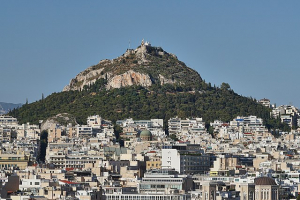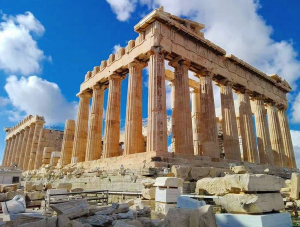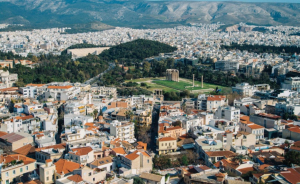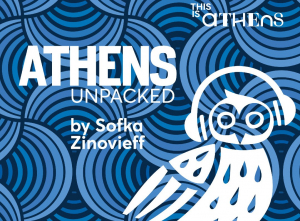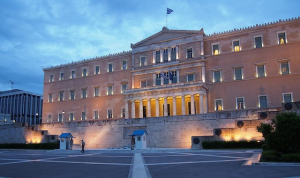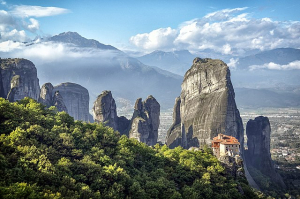ABOUT US
XpatAthens
Lycabettus Hill To Undergo Major Makeover
Athens Deep Dive
How To Ask Something In Greek - Two Useful Verbs
For any Greek language learner, memorizing verbs and learning to conjugate them correctly, is one of the first things you need, in order to make a correct Greek sentence.
Two Greek verbs that many Beginners and even Intermediate students find quite confusing are ρωτάω (rotao) and ζητάω (zitao). The main obvious cause of this confusion is that both verbs mean “to ask” in English. However, in Greek, there is a difference in “asking”!
Both verbs mean to ask, but:
ρωτάω = to ask (a question)
ζητάω = to ask for something
Take a look at the video below, where teacher Marina explains how to use these verbs. The video will also help you with the correct pronunciation.
If you'd like to learn more grammar and do a small exercise to test your knowledge, please visit: omilo.com
Omilo Greek Language and Culture inspires people from all over the world to learn Greek, while exploring Greece. They offer 1- and 2-week courses for adults that combine beautiful course locations, experienced teachers, and a balanced combination of Greek classes with cultural activities. All these make Omilo a place where people enjoy learning modern Greek and have fun.
Besides the courses, Omilo also creates online publications to help adults expand their language skills through Language Books and eBooks for different language levels.
Athens Unpacked Episode 2 - From Dreams To Demolition
And then how a very Greek system was used to tear that down and replace it with a concrete landscape of apartment blocks,” says Sofka Zinovieff in this second episode devoted to the Athens aesthetic. Hear how a Bavarian Monarch's grand designs on Athens from the 1830s created a neoclassical European city. And why Athenian housewives of the 1950s welcomed the demolition of their former dwellings.
Bestselling writer and former anthropologist, Sofka Zinovieff, embarks on a quest to uncover the true essence of her adopted home, in all its layers and mysteries. Discover how Athenians feel about their own architecture, how tragedy and trauma have flavored the city’s cuisine, why Athens has always been a “15-minute city”, and much, much more.
Listen To Episode 2 HERE
Thank you This is Athens for your contribution as an XpatAthens Partner.
Athens Unpacked Episode 1 - Up Above & Down Below
Bestselling writer and former anthropologist, Sofka Zinovieff, embarks on a quest to uncover the true essence of her adopted home, in all its layers and mysteries. Discover how Athenians feel about their own architecture, how tragedy and trauma have flavored the city’s cuisine, why Athens has always been a “15-minute city”, and much, much more.
Produced by Pod.gr, for This is Athens, tune in each fortnight and get ready to capture the seductive soul of Athens!
Thank you This is Athens for your contribution as an XpatAthens Partner.
Athens Unpacked - A Podcast Series From This Is Athens
This is not just another podcast series. It's more of a documentary where you’ll visit a lesser-known aqueduct built by a Roman emperor, meet the capital’s most exposed skeleton, encounter the alternative culture behind Rembetika (Greece’s answer to the blues), climb a historic off-grid hill with a former archaeologist, experience a refugee neighborhood, browse a bustling farmer’s market with a local foodie, and explore the omnipresent legacy of the ancient philosophers and politicians. What a brilliant way to connect with the heart and soul of Athens!
To embark on this audio odyssey of Athens, please visit: thisisathens.org or subscribe here on Spotify, Apple Music, Pocket Casts, or wherever you listen to your podcasts.
In this debut episode, you'll get acquainted with the geography of the Athenian basin and Zinovieff's theory of the 3 hills (Acropolis, Lycabettus & Tourkovounia), all while exploring the Syntagma Metro skeleton and Hadrian's aqueduct.
In this episode, follow Zinovieff as she explores the surprisingly diverse fabric of Athens and explains how the city went from being a European neoclassical capital in the 1830s to a concrete oasis brimming with apartment blocks in the 1950s.
In the series' third episode, Sofka explains why Athens is "the most foreign capital of the world" consisting of numerous villages, all with their own distinct character. Explore the neighborhoods of Pangrati and Anafiotika, Athens' only true remaining village, and learn all about the journey of the Greeks of Asia Minor who fled the 1922 Catastrophe.
4. Feasting & Fasting - FIND THE EPISODE HERE
This mouth-watering episode is all about food! Visit the Ampelokimpoi Laiki, discover the character of Greek cooking, get acquainted with Greek regional cuisines, like Cretan, and discover international flavors.
5. Taking To The Streets - FIND THE EPISODE HERE
In this episode, Sofka sets to explore the Athenians' beloved outdoor activities, from cafes to concerts and open-air cinemas. Find out why taking to the streets is part and parcel of everyday life in Athens and listen to the secret confessions of a young graffiti artist.
This is Athens is the official guide to this captivating city of ancient energies and booming urban culture. Compiled by a team of specialist local writers, This is Athens brings you an authentic and intimate portrait of a living Athens beyond the guidebooks – along with daily curated listings of all the best events and great weekend inspiration all-year round. From must-know neighbourhoods and emerging art hubs, to gourmet hotspots, cool shopping and the buzziest bars, This is Athens will help you to get the most out of living in Athens!
Thank you This is Athens for your contribution as an XpatAthens Partner.
Exploring The Urban Soul Οf Athens With Sofka Zinovieff
Recently, she launched her new podcast series “Athens Unpacked” for This is Athens and she shares some snappy tips for digging beyond the Acropolis—to the heart and soul of this captivatingly complex city.
You’ve called Athens home for 20 years. How has your relationship with the city changed and matured since you first moved here from England?
I’ve had several phases in my relationship with Greece. I first came as a research student in the late 80s, learned the language, and became involved with the place. During the last two decades, my relationship with Athens has been like a marriage – committed and based on love, but with squabbles and occasional rough patches.
What’s the most common misconception people have about Athens that you’d most like to correct?
People often visit during the hottest time of year, in a rush on the way to an island. Athens appears impenetrable and overheated. It’s a completely different city at other times of the year and can’t be rushed. I’d advise talking to locals and adopting their timetable (not going out during the middle part of the day in summer). I’d also suggest that it’s the perfect city to visit in autumn, winter or spring.
Athens is a hectic metropolis with the heart and soul of a village. Would you agree with this statement and if so, how does that village vibe manifest?
Yes, Athens has been settled by villagers ever since it became the capital of modern Greece in the 1830s. Even today, most people have roots elsewhere and return to their village or island. And that’s before we look at how neighborhoods can be quite villagey, designed around their plateia (main square) with a traditional coffee shop and church, etc.
Would you classify Athens as a city that’s easy to get to know; that reveals itself readily to visitors?
Athens is a mysterious city and sometimes challenging. But many of its charms are readily apparent: the intertwining of the ancient and the modern; the neighborhoods for strolling; and the fabulous places for eating out are all there and waiting.
If someone has only 48 hours or a weekend here, how can they best tap into the authentic pulse of Athens?
Stroll around the neighborhoods. Eat and drink where Athenians do. Pause to notice the details rather than ticking off a list of ‘the sights’. And, to get a sense of perspective, go up a hill—I don’t mean the Acropolis—there are plenty of others, such as Lycabettus, Philopappou, or even a more off-radar one like Tourkovounia (the Turkish Mountains).
To read this article in full, please visit: thisisathens.org
Photo by: Thomas Gravanis
Thank you This is Athens for your contribution as an XpatAthens Partner.
The History Of Syntagma Square
To read this article in full, please visit: greekreporter.com
Photo Credit: Dario Sušanj
Tourism On The Rise & Greece's Top Destinations
Are you living in Greece right now? What destinations would you recommend for visitors to explore in Greece?
Greece’s number one island destination for tourists, Santorini is a volcanic island in the Cyclades, mostly famous for its cliff-top towns of Fira and Oia hanging above a sea-filled caldera. Traditional whitewashed cubic houses, black volcanic sand beaches, picturesque villages, and magical sunsets, it's no wonder Santorini is the most romantic of all the Greek islands.
Nafplio, the first capital of modern Greece, is considered by many the most beautiful city in the whole country. Indeed, its uniquely distinctive character and romantic aura are sure to take your breath away. Neo-classical mansions, hidden churches, the Palamidi Fortress, a true architectural masterpiece offering mesmerizing views of the Argolic Gulf, and the water castle of Bourtzi, Kolokotronis' first prison, are only some of the town's major attractions.
4. Meteora
Located in Thessaly, Meteora is an awe-inspiring sight that has been attracting visitors from all over the world. A vast terrain of rocky formations, Meteora is known for its dozens of Eastern Orthodox monasteries situated on top of massive boulders. In addition to visiting the Monasteries, one can engage in a variety of outdoor activities, including rock climbing, hiking, and kayaking.
A UNESCO world heritage site, Delphi used to be considered as the center of the world by Ancient Greeks. Located at the foot of Mount Parnassus, the sanctuary of Delphi, dedicated to Apollo, was for many centuries home to Pythia, the major oracle who was consulted about important decisions throughout the ancient classical world. The site consists of the ruins of many temples, a theater, and a stadium, built between the 8th century BC and the 2nd century AD.
Athens Among UNICEF's Child Friendly Cities
A Memorandum of Cooperation between the Municipality of Athens and UNICEF has been signed which states that the Greek capital is officially participating in the Child-Friendly Cities Initiative (CFCI); this is a UNICEF-led initiative that supports municipal governments in realizing the rights of children at the local level.
- Reduce child poverty through targeted interventions.
- Promote access and enhance educational opportunities.
- Prevent violence against children, including children who are victims of domestic or community violence.
- Promote education through continuous skills development.
- Promote youth employment.
- Promote the participation of children and young people in decision-making processes.
- Encourage healthy eating habits.
- Promote gender equality.
- Enhance environmental awareness.

